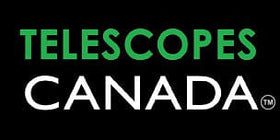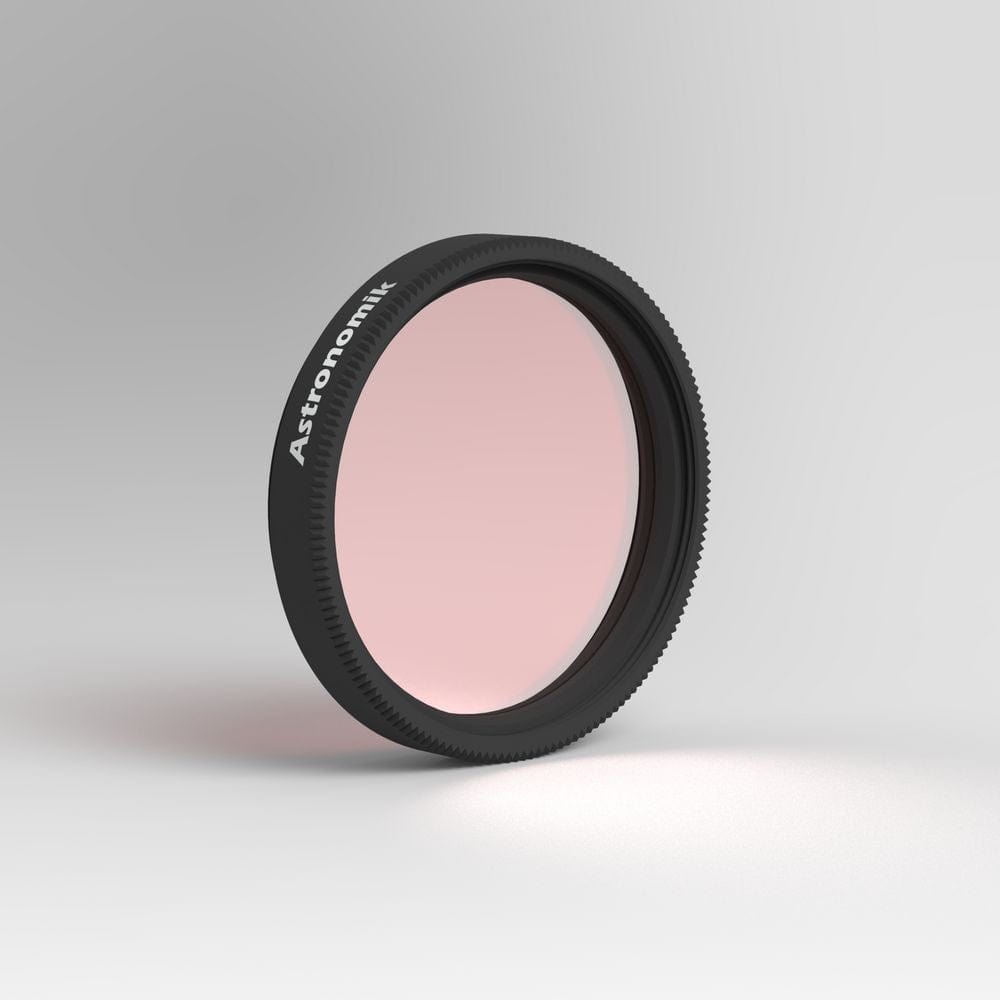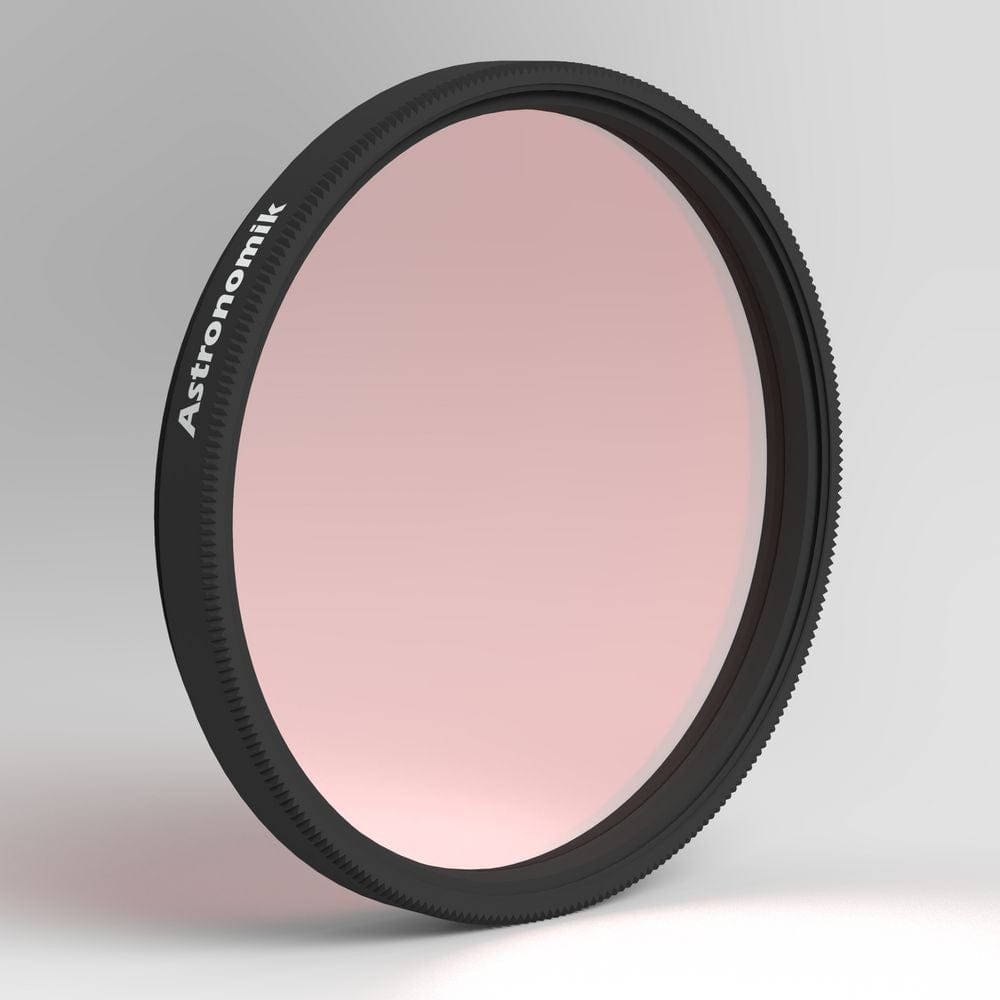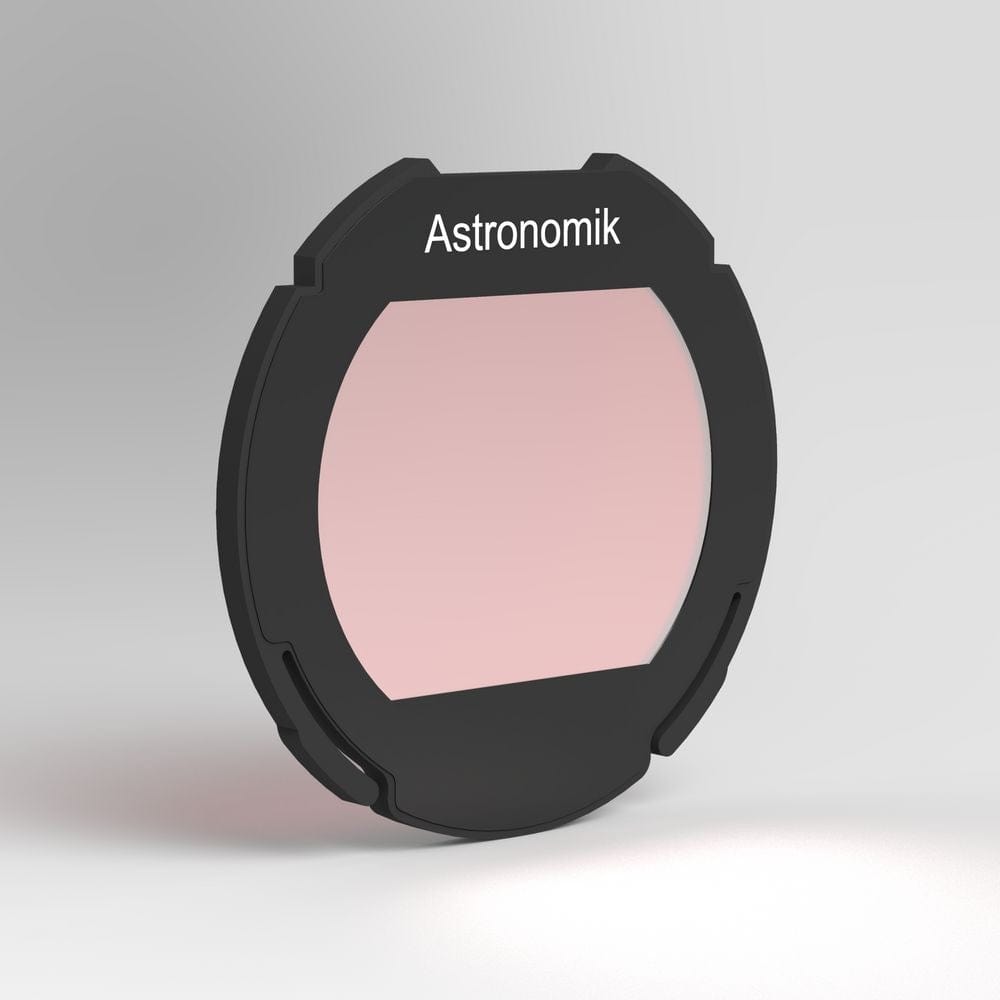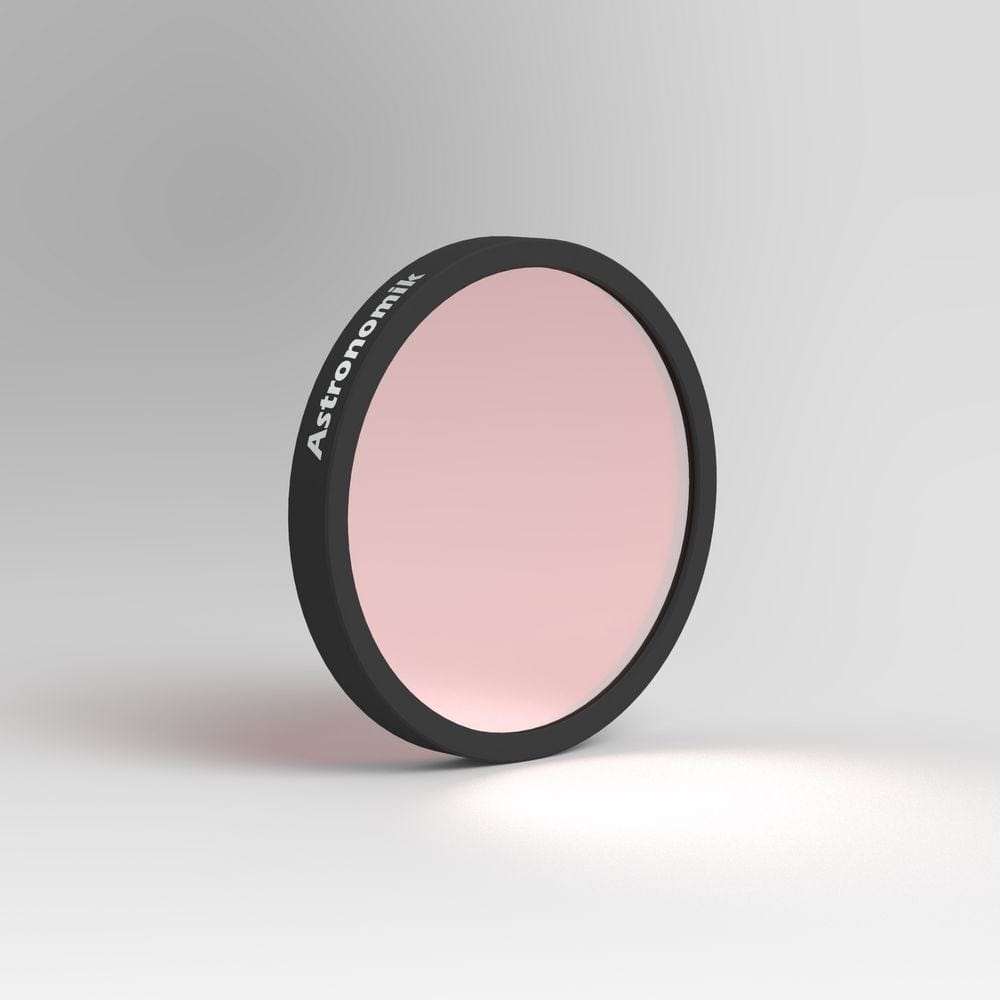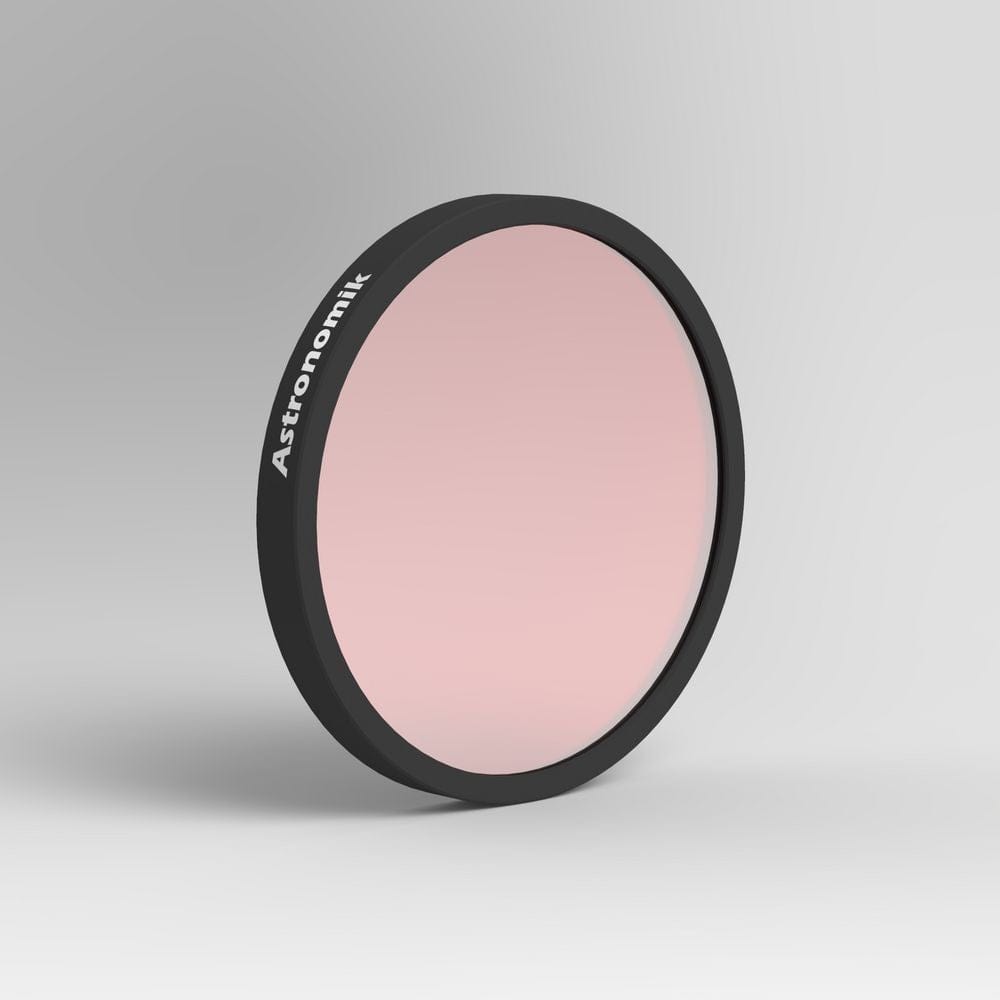Description
The Astronomik ProPlanet 642 BP is the latest addition to the family of Astronomik ProPlanet IR-pass filters. The filter thrills because of it´s wide range of applications for daylight IR-Photography, high-resolution lunar and planetary imaging and for taking beautiful and deep images of H-alpha regions when used for Astrophotography.
"BP" is short for "Band-pass": The filter gives you a 200nm spectral window from 642nm to 842nm. Contrary to the other two ProPlanet filters it blocks the longer infrared. Together with the Astronomik ProPlanet 742 and the ProPlanet 807 you can now have three choices to match your needs when imaging in the IR. The Astronomik ProPlanet 642 BP will be the right choice for the best image quite often!
Highlight of the Astronomik ProPlanet 642 BP: Three filter in one!
The Astronomik ProPlanet 642 BP will give you three filters in one single product! Depending on your camera, the Astronomik ProPlanet 642 BP is a great tool either for daylight IR-imaging with your digital camera, or it will reduce seeing effects and enhance contrast when used for lunar- and planetary imaging, and third it will be a very good and low-priced H-alpha Filter for getting started in Deep-Sky Astrophotography of H-alpha regions.
Due to our skillful development with lots of tests we reached the goal to give you a filter which will do a perfect job to deliver amazing images.
Daylight IR-imaging:
- High contrast images with a great rendition of colors
- Clear "Wood-Effect" images
- Not Hot-Spot from longer IR!
- Short exposure times, about the same as normal VIS-imaging
- perfect choice for Infrared-Videos
High-resolution Lunar and planetary imaging:
- short Exposure times
- effective reduction of Seeing
- enhanced contrast
- no ghosts and best sharpness due to blocking the longer IR
Deep-Sky Astrophotography of HII regions:
- best transmission of the H-alpha line at 656nm
- about 40nm FWHM with astro-modified DSLRs
- amazing contrast under light-polluted skies or moonlight
- low priced filter for getting started in H-alpha imaging
- easy focusing using camera display plus LiveView!
Guiding for Astrophotography:
- installing the 642BP in front of your autoguider-camera dramatically improves guiding quality, as image-motion from one frame to the next is minimized.
A Detailed description of the opportunities the Astronomik ProPlanet 642 BP will give you:
1) Daylight IR-imaging
Starting point for the development of the Astronomik ProPlanet 642 BP was infrared imaging at daylight with modified DSLR cameras.
Normal, unmodified DSLRs do have a built in Infrared-Blocking-Filter as the sensors alone are sensitive up to 1100nm. If this internal filter is removed, the camera can be used for for the thrilling field of infrared imaging.
The Astronomik ProPlanet 642 BP opens it´s window already in the very deep red and gives you all light up to 842nm. You get images which are perfectly suited for channel-changing, and which will show an incredible level of colors and great contrast do to the blocking of the longer IR: A great set of data to start creative image processing!
The following image give you an impression of the possibilities of IR photography:
Move the green slider in the lower left corner to highlight the difference.
Villadeati
- a village on the hills of Piedmont, Italy -
(c) Domenico Rota
Astronomik 642BP im Vergleich zum UV IR Block Filter
Do you use the Astronomik ProPlanet 642 BP for Daylight IR-imaging? Share your best images with us!
2) High-Resolution Lunar & Planetary imaging
High-Resolution imaging of the moon and the planets is a part of astrophotography which has evolved in the past 20 years at an incredible speed. Amateurs from all over the world can take images which were far beyond reach even for the very best equipped professional observatories 20 years ago.
You will need a low noise video-camera and dedicated image-processing like AstroStakkert, Registax or AviStack plus a infrared-pass filter to enter this field of astrophotography!
Why Infrared? Every observer knows the flickering stars and planetary disks when looking through an eyepiece or at your monitor Slight differences in temperature and pressure result in a different index of refraction for "bubbles" of air. As these bubbles move, the image moves too! This effect is called "Seeing".
This change in the index of refraction becomes smaller the further you go to the infrared (longer wavelengths), and due to that, the Seeing becomes better too!
When observing with the human eye we have no options: The human eye is not sensitive to infrared light. But with the CCD or CMOS sensors from our camera we can go to the infrared part of the spectrum and enjoy the steady air.
An Infrared-Pass filter like the Astronomik ProPlanet 642 BP blocks all unwanted visual light and gives you infrared light only!
The amount of seeing is changing very fast, so there is no universal filter that will do it every time. So the Astronomik ProPlanet 642 BP is the third filter in this line of Products in addition to the Astronomik ProPlanet 742 and ProPlanet 807! When seeing is no really bad, the ProPlanet 642 BP will be usually the first choice and will give you best results as it blocks the longer IR too!
While we were developing this new filter, several observers had our prototype filters for testing. Most of them reported that the Astronomik ProPlanet 642 BP gave them the very best images compared with filters from other manufacturers. The sharpness and high contrast resulted in the best final images in nearly all situations!
Jupiter with Ganymede
(c) Karl Thurner
Jupiter With Ganymede
(c) Hartwig Luethen
3) Deep-Sky astrophotography of H-alpha regions:
The Astronomik ProPlanet 642 BP has already reached it´s full transmission of nearly 100% at the famous line of H-alpha at 656nm. -All light coming from the beautiful HII regions can reach the sensor of your camera, while all shorter light and nearly all artificial light pollution is filtered out!
Combined with a typical astro-modified DSLR you will get a spectral window of about 40nm which results in a very dark background and a high contrast. With the Astronomik ProPlanet 642 BP installed in your camera, it´s possible to do nice shoots of H-alpha regions even when the moon is up: Lunar stray light is filtered out very effective!
"How long do I have to expose longer?" -That´s a very common question from customers from all over the world.
The answer is quite easy: You don´t have to expose longer, you MAY expose longer!
Due to the high transmission of nearly 100% you will have the same amount of photons with a wavelength of 656nm on your sensor, weather you have the filter installed or not. But, with the Astronomik ProPlanet 642 BP installed, the background sky will be very dark, while it would be very bright -or even saturated- when imaging without the filter! The filter blocks photons with other energies and give you a higher contrast. With the filter installed you MAY expose longer to collect more photons from your object of desire till the background is getting brighter again!
A narrow band emission-line filter like the Astronomik H-alpha filter with 12nm or 6nm FWHM will do the job much better (it blocks more of the unwanted light), but the lower price of the Astronomik ProPlanet 642 BP is very attractive for beginners in this field of astrophotography! Additional to that the real emission line filters are quite difficult to use for beginners as focusing can be quite difficult with them. With the Astronomik ProPlanet 642 BP you will usually have enough light to use the LiveView monitor on the back of your camera!
Taken all this together the new Astronomik ProPlanet 642 BP is the ideal filter for getting started in H-alpha imaging with your modified DSLR!
California Nebula imaged with a Canon 80D(mod) and Astronomik ProPlanet 642BP Clip-Filter
(c) Thomas Tomz Henriksen, Dänemark
Technical Data
- more then 96% transmission for wavelengths of 642nm to 840nm
- blocking of wavelengths between 350nm and 630nm
- Par focal with other Astronomik filters
- Glass thickness: 1mm
- Completely resistant against high humidity, scratches and aging effects
- Diffraction limited, the filter will not reduce the optical performance of your telescope!
- Astronomik filters are delivered in a high-quality, long lasting, filter box
- Since 2008 we do ship filters with a completely new design. Any kind of halo or strange reflection is a matter of past
Some Sizes Available From Astronomik (More added regularly) - Please ask us if we don't have a price listed for the one you would like
- 1.25" (M28.5)
- 2" (M48)
- T-thread Cell (M42x0.75)
- SC-Cell (2" / 24TPI)
- Ø27mm
- Ø31mm
- Ø36mm
- Ø42mm
- Ø50mm
- 50x50mm
- EOS APS-C Clip-Filter
- EOS M Clip-Filter
- EOS XL Clip-Filter
- Sony Alpha Clip-Filter
- Nikon XL Clip-Filter
- Nikon Z XL
- Pentax K Clip-Filter
- M52
